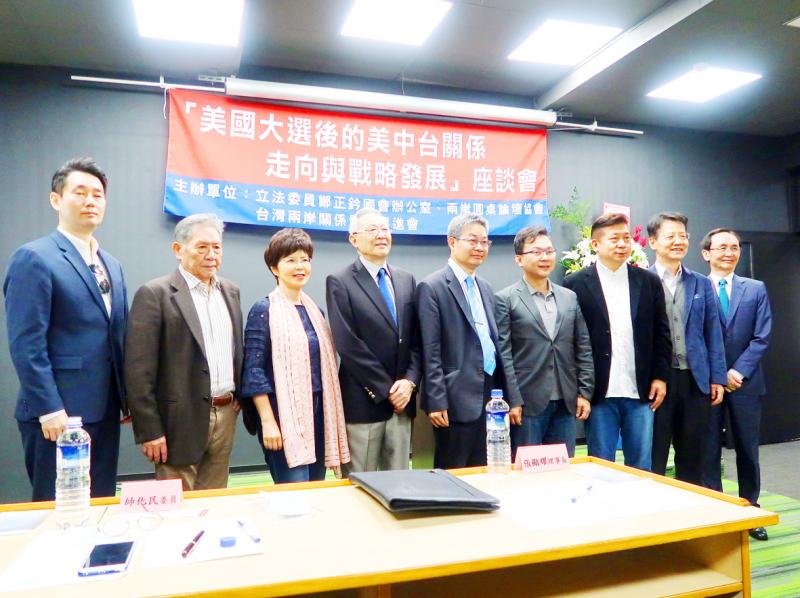China would not attack Taiwan before 2024, as long as President Tsai Ing-wen (蔡英文) does not push for de jure independence or moves to rely on foreign countries for security, an academic said yesterday.
Chao Chun-shan (趙春山), a professor emeritus at the Institute of China Studies at Tamkang University, made the remarks at a forum organized by the Taiwan Cross-Strait Roundtable Forum Association, which is affiliated with the Chinese Nationalist Party (KMT).
“The US would not change its policy for ‘strategic ambiguity’ on Taiwan, while the US and China would continue to have confrontations and cooperation, as in trade matters,” Chao said.

Photo: Chen Yu-fu, Taipei Times
“The key for Taiwan is to avoid becoming embroiled in US-China conflicts, while striving for inclusion on issues where the two sides cooperate,” he said.
Taiwan was only mentioned briefly in 15 words during Chinese President Xi Jinping’s (習近平) address at the Fifth Plenary Session of the 19th Chinese Communist Party (CCP) Central Committee in Beijing last week, Chao said.
“Xi did not talk about ‘one country, two systems’ nor warn against Taiwan independence,” he added.
“Next year Beijing is to celebrate the 100-year anniversary of the founding of CCP, so it is highly unlikely that China would start a war,” he said, adding that the CCP would hold its 20th National Congress in 2022.
“How can Xi start a war in the Taiwan Strait during this period?” Chao said.
In addition, the CCP’s deadline to complete its military modernization effort is 2027, when it would mark the 100-year anniversary of the Chinese Red Army, the predecessor of the Chinese People’s Liberation Army, he said.
“Therefore, as long as President Tsai does not push for de jure independence, and avoids overreliance on foreign countries for security, then we are certain that China would not attack Taiwan before 2024,” he said.
US President Donald Trump and former US vice president Joe Biden, Trumps contender in Tuesday’s presidential election, agree on deterring China’s rise as a regional power, and confrontations between the nations would continue in the long term, Chao said.
“We would not see much change in this strategy, except in its application,” he added.
“Biden favors multilateralism, while he is against decoupling from China, so Taiwan need its own strategy, and cannot just follow US policy as before,” Chao said.
“No matter which candidate ends up in the White House, the US and China will continue to compete on trade, technology and military capabilities... Taiwan has to carefully and closely observe changes in US-China-Taiwan relations to find the most appropriate approach going forward,” association chairman and former Mainland Affairs Council deputy minister Chang Hsien-yao (張顯耀) said.
Additional reporting by CNA

Nipah virus infection is to be officially listed as a category 5 notifiable infectious disease in Taiwan in March, while clinical treatment guidelines are being formulated, the Centers for Disease Control (CDC) said yesterday. With Nipah infections being reported in other countries and considering its relatively high fatality rate, the centers on Jan. 16 announced that it would be listed as a notifiable infectious disease to bolster the nation’s systematic early warning system and increase public awareness, the CDC said. Bangladesh reported four fatal cases last year in separate districts, with three linked to raw date palm sap consumption, CDC Epidemic Intelligence

Two Taiwanese prosecutors were questioned by Chinese security personnel at their hotel during a trip to China’s Henan Province this month, the Mainland Affairs Council (MAC) said yesterday. The officers had personal information on the prosecutors, including “when they were assigned to their posts, their work locations and job titles,” MAC Deputy Minister and spokesman Liang Wen-chieh (梁文傑) said. On top of asking about their agencies and positions, the officers also questioned the prosecutors about the Cross-Strait Joint Crime-Fighting and Judicial Mutual Assistance Agreement, a pact that serves as the framework for Taiwan-China cooperation on combating crime and providing judicial assistance, Liang

The manufacture of the remaining 28 M1A2T Abrams tanks Taiwan purchased from the US has recently been completed, and they are expected to be delivered within the next one to two months, a source said yesterday. The Ministry of National Defense is arranging cargo ships to transport the tanks to Taiwan as soon as possible, said the source, who is familiar with the matter. The estimated arrival time ranges from late this month to early next month, the source said. The 28 Abrams tanks make up the third and final batch of a total of 108 tanks, valued at about NT$40.5 billion

Reports of Taiwanese going missing, being detained or interrogated, or having their personal liberties restricted in China increased about fourfold annually last year, the Mainland Affairs Council (MAC) said yesterday. Last year, 221 Taiwanese who traveled to China were reported missing, were detained and interrogated, or otherwise had their personal freedom restricted, up from 55 the previous year, the council said. Reopening group tours to China would be risky, as it would leave travelers with no way to seek help through official channels after Beijing shut down dialogue between the associations tasked with handling cross-strait tourism, the MAC said. Taipei’s Taiwan Strait Tourism